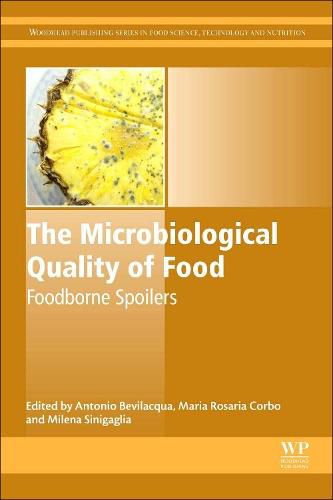Readings Newsletter
Become a Readings Member to make your shopping experience even easier.
Sign in or sign up for free!
You’re not far away from qualifying for FREE standard shipping within Australia
You’ve qualified for FREE standard shipping within Australia
The cart is loading…






The Microbiological Quality of Food: Foodborne Spoilers specifically addresses the role of spoilers in food technology and how they affect the quality of food. Food spoilers represent a great challenge in food quality, determining the shelf-life of many products as they impact consumer acceptability of taste, texture, aroma, and other perceptions.
Divided into four sections, the first section defines microbial spoilage of food, with special emphasis on methods for the evaluation of spoiling phenomena and the status of their regulatory framework, examining both existing regulations and possible gaps. The second section examines spoiling microorganisms, covering a range of common spoilage microorganisms, including pseudomonas, yeasts, and molds and spore formers, as well as less-common spoilers, including lactic acid bacteria and specific spoilage organisms in fish.
The third section highlights spoiling phenomena within certain food types. Chapters cover dairy, fish, meat, and vegetables, and other products. The final section investigates emerging topics which point to future trends in the research of food spoilers. There is insight into microorganisms resistant to preservation, the role of biofilms in food quality, and the link between food safety and food spoilage, with a special emphasis on certain spoiling microorganisms which could be opportunistic pathogens. Written by an international team of leading authors, this book provides state-of-the-art coverage of this topic, which is essential to the shelf-life and quality of food.
$9.00 standard shipping within Australia
FREE standard shipping within Australia for orders over $100.00
Express & International shipping calculated at checkout
The Microbiological Quality of Food: Foodborne Spoilers specifically addresses the role of spoilers in food technology and how they affect the quality of food. Food spoilers represent a great challenge in food quality, determining the shelf-life of many products as they impact consumer acceptability of taste, texture, aroma, and other perceptions.
Divided into four sections, the first section defines microbial spoilage of food, with special emphasis on methods for the evaluation of spoiling phenomena and the status of their regulatory framework, examining both existing regulations and possible gaps. The second section examines spoiling microorganisms, covering a range of common spoilage microorganisms, including pseudomonas, yeasts, and molds and spore formers, as well as less-common spoilers, including lactic acid bacteria and specific spoilage organisms in fish.
The third section highlights spoiling phenomena within certain food types. Chapters cover dairy, fish, meat, and vegetables, and other products. The final section investigates emerging topics which point to future trends in the research of food spoilers. There is insight into microorganisms resistant to preservation, the role of biofilms in food quality, and the link between food safety and food spoilage, with a special emphasis on certain spoiling microorganisms which could be opportunistic pathogens. Written by an international team of leading authors, this book provides state-of-the-art coverage of this topic, which is essential to the shelf-life and quality of food.